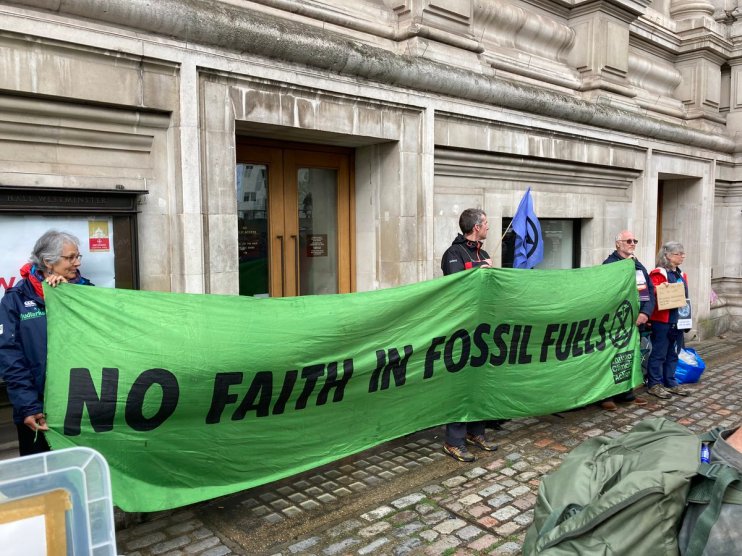Shell’s climate plans backed by shareholders despite activist disruption

Shareholders have backed Shell’s climate transition plans in a crucial vote at the energy giant’s annual general meeting (AGM) in London, despite pressure from climate protestors who brought proceedings to a halt for three hours in the morning.
Investors voted 79 per cent in favour of a motion – Resolution 20 – to support its environmental strategy, which includes reducing net carbon intensity by 20 per cent before the end of the decade, alongside a long-term net zero target of 2050.
This is a drop from last year’s vote, when 89 per cent of shareholders greenlit the plans, but will still come as a relief for the energy giant after dozens of activists – including protestors from Extinction Rebellion – stormed Methodist Hall at the start of the meeting, chanting “Shell Must Fall” and holding up banners.
The demonstration resulted in a forty minute stand-off with Shell’s board, with the energy firm’s chairman Sir Andrew Mackenzie failing to pacify the protestors, ultimately pausing proceedings until police arrived on the scene.
The company’s executive team and shareholders moved to another room for lunch before restarting the session, as several activists had glued themselves to their seats.
Protestors continued to bang drums and make speeches outside of the building, and three people were arrested – two for attempted criminal damage, and one for criminal damage.
Activist investors put Shell’s plans in the spotlight
Alongside direct protests, Shell has also faced criticism from activist investors for a lack of ambition in its climate plans.
This includes concerns over a lack of detail in how Shell will minimise scope three emissions – from services, goods and journeys associated with its business.
It has also been criticised for an over-reliance on carbon capture and technological innovations.
Nevertheless, it held off an activist challenge from Dutch group Follow This, whose counter-proposal was voted down with only 20 per cent support.
Last year, its proposal garnered 30 per cent of the vote among shareholders.
The group had filed Resolution 21, a motion requiring Shell to publish targets consistent with the Paris Climate Agreement, which pledges to limit temperature increases to two degrees from pre-industrial levels.
Follow This argued the commitment was necessary to prevent severe disruption when meeting climate goals over the coming decades.
However, in the run-up to the vote, Shell had described the commitments as “unrealistic”, and required the company to take a more radical pathway than either proposed environmental bodies such as the IPCC or IEA.
Growing prospect of windfall tax looms over AGM
Today’s AGM was Shell’s first in London since it simplified its Anglo-Dutch structure in December by relocating its headquarters to the UK.
Shell has recently reported record underlying profits of $9.13bn for the first three months of trading this year, powered by soaring oil and gas prices.
Its success has reignited calls from the Labour Party for a windfall tax, with the Chancellor reportedly leaning towards bringing in a one-off levy to ease record household energy bills which have risen to nearly £2,000 per year.
The energy giant has committed £20-25bn investment in the UK’s energy sector, with Downing Street keen to ramp up domestic energy generation to reduce its reliance on overseas suppliers following Russia’s invasion of Ukraine.
Commenting on the result, Shell’s chief executive officer Ben van Beurden said: “We are pleased that the overwhelming majority of shareholders continue to support Shell, our energy transition strategy and the progress we have made in the past 12 months. We are on the right track.”
He said the firm will consult shareholders and formally report back to investors within six months.